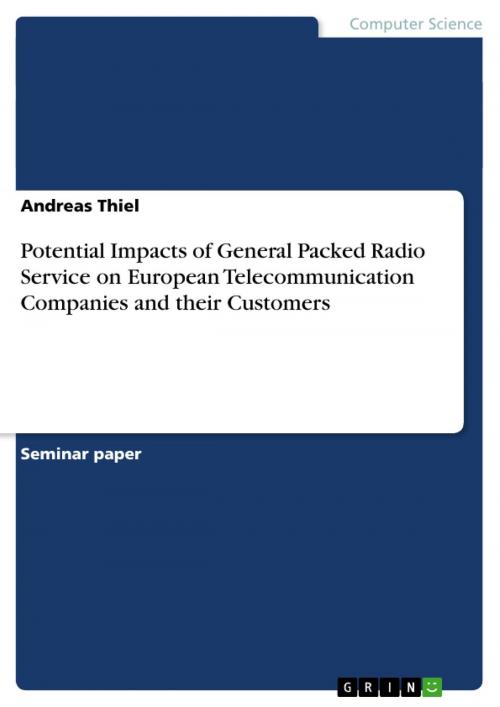Potential Impacts of General Packed Radio Service on European Telecommunication Companies and their Customers
Nonfiction, Computers, Advanced Computing, Computer Science| Author: | Andreas Thiel | ISBN: | 9783638159562 |
| Publisher: | GRIN Publishing | Publication: | December 17, 2002 |
| Imprint: | GRIN Publishing | Language: | English |
| Author: | Andreas Thiel |
| ISBN: | 9783638159562 |
| Publisher: | GRIN Publishing |
| Publication: | December 17, 2002 |
| Imprint: | GRIN Publishing |
| Language: | English |
Seminar paper from the year 2001 in the subject Computer Science - Commercial Information Technology, grade: A+ (92%), UNITEC New Zealand (School of Information Systems and Computing), course: The Impact of Information Technology on Society, 15 entries in the bibliography, language: English, abstract: 1 Introduction 1.1 GPRS, the first Step towards unlimited Communication? '46.8 percent of Europeans owned a mobile phone in 2000' (Hobley, 2001, p. 6). Since this high penetration was achieved in a relatively short time period, nearly all telecommunication companies showed huge growth rates. This applied for mobile operators, telecommunication network suppliers as well as for mobile phone producers and went in line with skyrocketing share prices. Since mobile phone penetration was already very high, telecom companies' growth rates shrank dramatically over the last year and share prices fell according to that. Consequently, telecom companies had to invent new gadgets to encourage people to buy new mobile phones and sign new contracts with mobile operators. Therefore, research concentrated on greater bandwidth in order to widen the functionality of mobile phones and to increase usage time. Telecom companies have the vision that sooner or later everybody will use a mobile phone not only to call other people, but also to access the Internet from everywhere and at any time. These 'multimedia entertainment and information terminals' (Berton, 2001, p. 18) would lead to increased data traffic and, therefore, higher revenues for mobile operators. Furthermore, constant improvements of infrastructure and mobile devices would ensure further sales for network suppliers and mobile phone manufacturers. General Packed Radio Service (GPRS) is considered to be the first step in that direction, which will be followed by Universal Mobile Telecommunications System (UMTS).
Seminar paper from the year 2001 in the subject Computer Science - Commercial Information Technology, grade: A+ (92%), UNITEC New Zealand (School of Information Systems and Computing), course: The Impact of Information Technology on Society, 15 entries in the bibliography, language: English, abstract: 1 Introduction 1.1 GPRS, the first Step towards unlimited Communication? '46.8 percent of Europeans owned a mobile phone in 2000' (Hobley, 2001, p. 6). Since this high penetration was achieved in a relatively short time period, nearly all telecommunication companies showed huge growth rates. This applied for mobile operators, telecommunication network suppliers as well as for mobile phone producers and went in line with skyrocketing share prices. Since mobile phone penetration was already very high, telecom companies' growth rates shrank dramatically over the last year and share prices fell according to that. Consequently, telecom companies had to invent new gadgets to encourage people to buy new mobile phones and sign new contracts with mobile operators. Therefore, research concentrated on greater bandwidth in order to widen the functionality of mobile phones and to increase usage time. Telecom companies have the vision that sooner or later everybody will use a mobile phone not only to call other people, but also to access the Internet from everywhere and at any time. These 'multimedia entertainment and information terminals' (Berton, 2001, p. 18) would lead to increased data traffic and, therefore, higher revenues for mobile operators. Furthermore, constant improvements of infrastructure and mobile devices would ensure further sales for network suppliers and mobile phone manufacturers. General Packed Radio Service (GPRS) is considered to be the first step in that direction, which will be followed by Universal Mobile Telecommunications System (UMTS).















